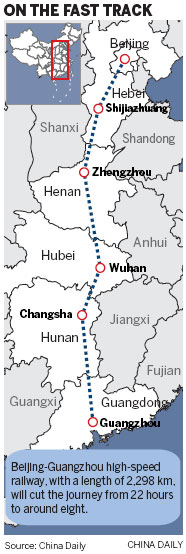All aboard for Beijing-Guangzhou railway
Updated: 2012-12-15 02:40
By XU JINGXI in Guangzhou and AN BAIJIE in Zhengzhou (China Daily)
|
||||||||
The high-speed rail route from Beijing to South China's Guangzhou will open on Dec 26, cutting the journey from 22 hours to around eight, the Ministry of Railways said on Friday.
It is the world's longest high-speed rail route, with a distance of 2,298 km, according to the ministry.
 |
The Wuhan-Guangzhou part of the route has been in operation since December 2009 and the Zhengzhou-Wuhan section opened on Sept 28 this year.
The designed speed of the Beijing-Guangzhou high-speed rail route is 350 km per hour, and the speed of the current operating section is about 300 km per hour, according to the ministry.
The Beijing-Zhengzhou section, the last part of the route, with a distance of 693 km, began trial operations on Nov 11.
The trial went smoothly with facilities functioning normally and the crew's emergency response capabilities enhanced, Wang Chunlei, a publicity official from Zhengzhou railway bureau, told China Daily on Friday.
The ticket price of the Beijing-Guangzhou high-speed railway remains unclear, but current prices on the Zhengzhou-Wuhan section show that the average cost per kilometer was 0.73 yuan (12 cents) for first-class and 0.46 yuan for second-class .
The Ministry of Railways released a new railway calendar on Thursday, with 15 more railway lines added, which is scheduled to be in use from Dec 21.
As one of the most important parts of China's high-speed railway network, the Beijing-Guangzhou high-speed railway will enhance transportation capacity and balance economic development between different regions, according to the ministry.
Shuai Bin, a professor at the School of Transportation and Logistics of Southwest Jiaotong University, told China Daily that transportation capacity on the Beijing-Guangzhou railway could not meet business demand in the past, and the high-speed railway is going to improve transportation capacity.
"The high-speed route links Beijing, the political center, with Guangzhou, the industrial hub, which has strategic meaning for China's politics and economy," he said.
Hong Bing, 36, a construction project manager in Zhengzhou who frequently travels to Beijing, said that the opening of the high-speed railway will make his business trips more comfortable and efficient.
"It currently takes at least five-and-a-half hours to travel from Zhengzhou to Beijing by train, but it will be shortened to less than three hours later this month," he said.
Liang Xiuxia, 39, traveled from her rural hometown in Zhoukou, Henan province, to Guangzhou 20 years ago and is now working as a hospital cleaner.
She earns 1,700 yuan per month and regards a ticket home by high-speed rail as "too expensive".
The nearest station along the Beijing-Guangzhou high-speed rail to Liang's hometown is in Luohe city, Henan province. A high-speed railway ticket for a trip from Guangzhou to Luohe will cost at least 586 yuan, more than one-third of Liang's monthly income and three times the price for a seat on an ordinary train.
"I won't consider going home by high-speed rail this Spring Festival because a round trip already costs me more than 1,000 yuan. And I still need to spend another 1,000 yuan to buy gifts for my family back in my hometown," said Liang, whose first choice is traveling by coach, not even by ordinary train, because she doesn't need to transfer to a bus from Luohe to Zhoukou.
She isn't excited about the high-speed railway even though it will take her only about six hours to go home. She would rather be on a bus or an ordinary train for more than 15 hours.
"Saving time doesn't matter to me. Saving money does. I think the main concern for every migrant worker is about money," said Liang.
"I don't eat breakfast to save one or two yuan per day, so I'm unlikely to spend 600 yuan on a train ticket."
The railway authorities should take migrant workers' needs into consideration when developing the high-speed railway, said Shuai Bin, the professor.
"High-speed railway tickets are unaffordable for most migrant workers, so railway authorities should open more low-speed railway lines during travel peak periods such as the Spring Festival," he said.
Contact the writers at xujingxi@chinadaily.com.cn and anbaijie@chinadaily.com.cn
Zhang Leilong in Zhengzhou contributed to this story.











